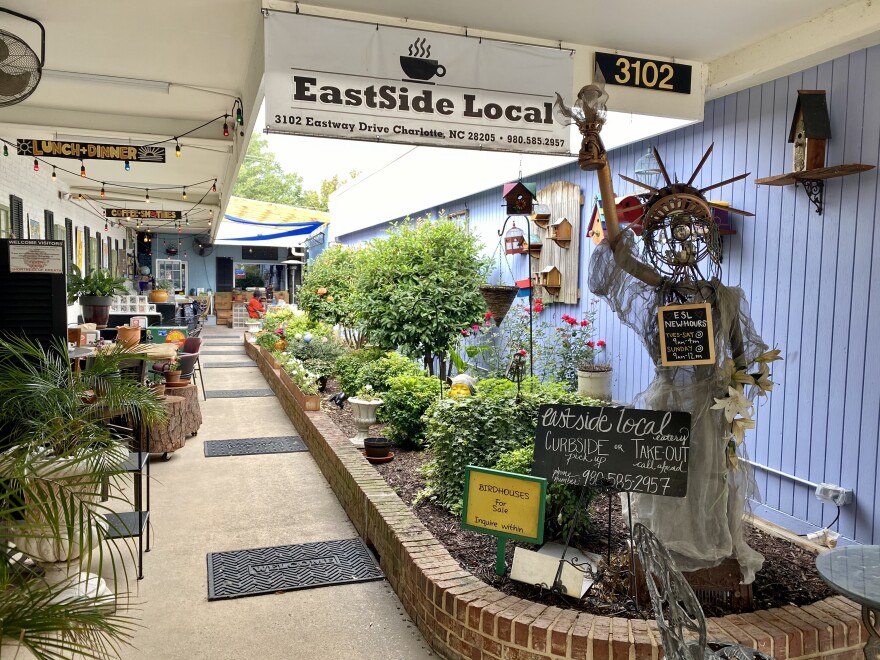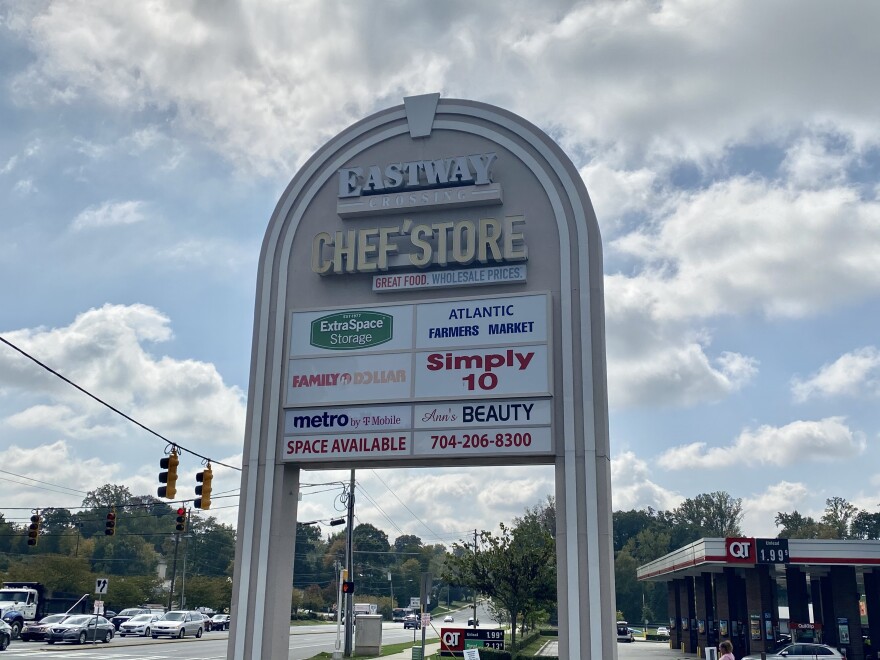In early October, Patrick Carroll walked around his store, Armada Skate Shop, in Charlotte’s Eastway Crossing shopping plaza. He put skateboards up on the wall and greeted customers as he waited for an update from a skateboard distributor in California.
This has become Carroll’s new routine: checking to see who has what in stock.
Minority-owned businesses have been hit hard by the coronavirus pandemic. A study out of Stanford University found 41% of Black business owners were forced to close shop between February and April this year. The Eastway Crossing plaza in east Charlotte is home to 33 businesses — a mix of at least 15 locally owned stores and chain stores.
Some of the Black-owned businesses there are struggling, and some, like Armada, are thriving both now and when the pandemic first grew.
When people were forced to stay at home, Armada saw a spike in sales. More and more people were coming in to buy skateboards.
But with that spike came a shortage in boards.

“Supply chain issues have been a factor,” Carroll said. “No people going to get raw materials, less people in the warehouse, less assembly, twice the demand and you have a conundrum.”
To keep up with demand, he’s ordering more boards at a time so that he always has some on hand. But while he’s happy for the growth, he’s also struggled with how to handle it. It’s taken a shift in mindset to be able to handle his business’ changing situation. Carroll’s never been comfortable ordering so many boards at a time, but he's realizing he can’t go back to the way things were.
It hasn’t been an easy road for the skate shop. In 2018, business wasn’t doing so great. Clientele was low and so were his finances. But when the coronavirus pandemic hit, people were forced to stay home, giving them time to reconnect with their inner child. Kids and adults were coming in to buy skateboards. Some were even looking for roller skates — anything to fill new free time that would normally be dedicated to work and commutes to the office.
In the spring, small businesses across the country received $659 billion in federal aid through the Paycheck Protection Program. There’s little data on the race of business owners who received loans. But the Center For Public Integrity reports that data from the U.S. Small Business Administration show that for loans of $150,000 or more, 14% of those loans provide information about the race or ethnicity of the business owner. Of that 14% , less than 2% of the loans went to Black-owned businesses.
Carroll says he applied for a PPP loan but was denied.
Other business owners in the Eastway Crossing plaza also were denied, like Kacie Smagacz, the owner of Move That Dough Baking Co. Smagacz is white and runs her baked goods shop inside Eastside Local restaurant. In March, the restaurant closed its doors for a couple months due to the pandemic.

During those months, Smagacz remained open, baking in the restaurant and delivering vegan and gluten-free treats to her customers across Charlotte. This helped her stay afloat during the shutdown — along with her savings and money donated from friends, family and customers.
Charlotte Mecklenburg Black Chamber of Commerce Chair Shanté Williams says in order to stay above water, many businesses had to dip into their savings or sell equipment. With more than 40% of Black businesses having to close their doors this year due to the pandemic, she says if you’re still open at the end of the year, you’ve got a pathway to go forward.
“You’ve now at least figured out what you can do for the next year-and-a-half to two years, before we’re really out of this thing,” she said.
A few doors down in the Eastway shopping plaza, Taj Essentials is back to operating like normal. Owner Ezaz Piyas sells body oils and butters from his little shop tucked in a corner of the plaza. He’s made it through the pandemic so far with the help of a $20,000 loan from the Small Business Administration. He was also denied a PPP loan.
His financial burdens started at the beginning of the shutdown, but mostly because of issues he was having with shipping. Piyas was deemed essential due to the products in his store — meaning he could stay open while other businesses closed.
But with everything around him shut down, it took longer to receive goods his shop needed to function. Things that normally took two to three weeks to arrive, were taking two to three months, if not longer. In addition to stay-at-home orders, it caused business to slow down.
“The financial burden came into place when merchandise wasn’t coming in as much, in the beginning, especially, when certain products weren’t in stock because manufactures weren’t in stock,” Piyas said. “And a lot of customers were turning away, especially those that were buying certain products that were out.”
The business slowdown also forced him to spend his savings taking care of his family and paying rent.
But Piyas also faced another challenge: Being a teacher in addition to running a store. He and his wife, Simone, are parents of two young children. When schools shut down, they had to balance managing the store and teaching their kids.

“We had to bring the kids in to work every day, set up a section in the back of the store where they can kind of do their virtual learning,” Piyas said. He and Simone took the challenge head on, always putting their children first.
Since Charlotte began reopening, business has been good and steady for Piyas. People are coming in for things to make their homes smell good. He’s even ushered in a new clientele looking for natural products to boost their overall immune systems at a time when everyone is worried about illness.
“There was another group of customers that wanted these natural products to help better their health,” he said.
Piyas and the other owners in the Eastway Crossing plaza say they are hopeful for the future. They feel like they’ve been through the worst of the pandemic and are now focused on moving their businesses forward.






